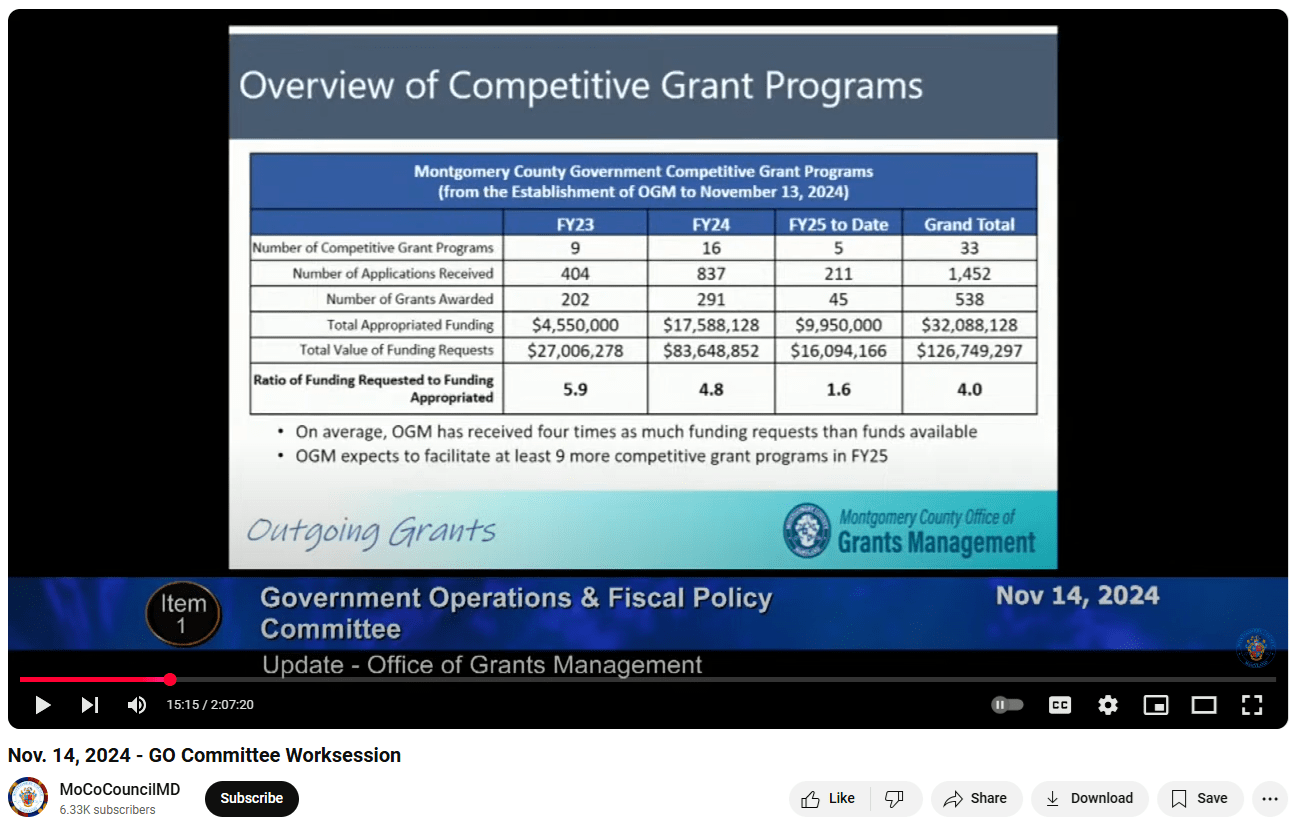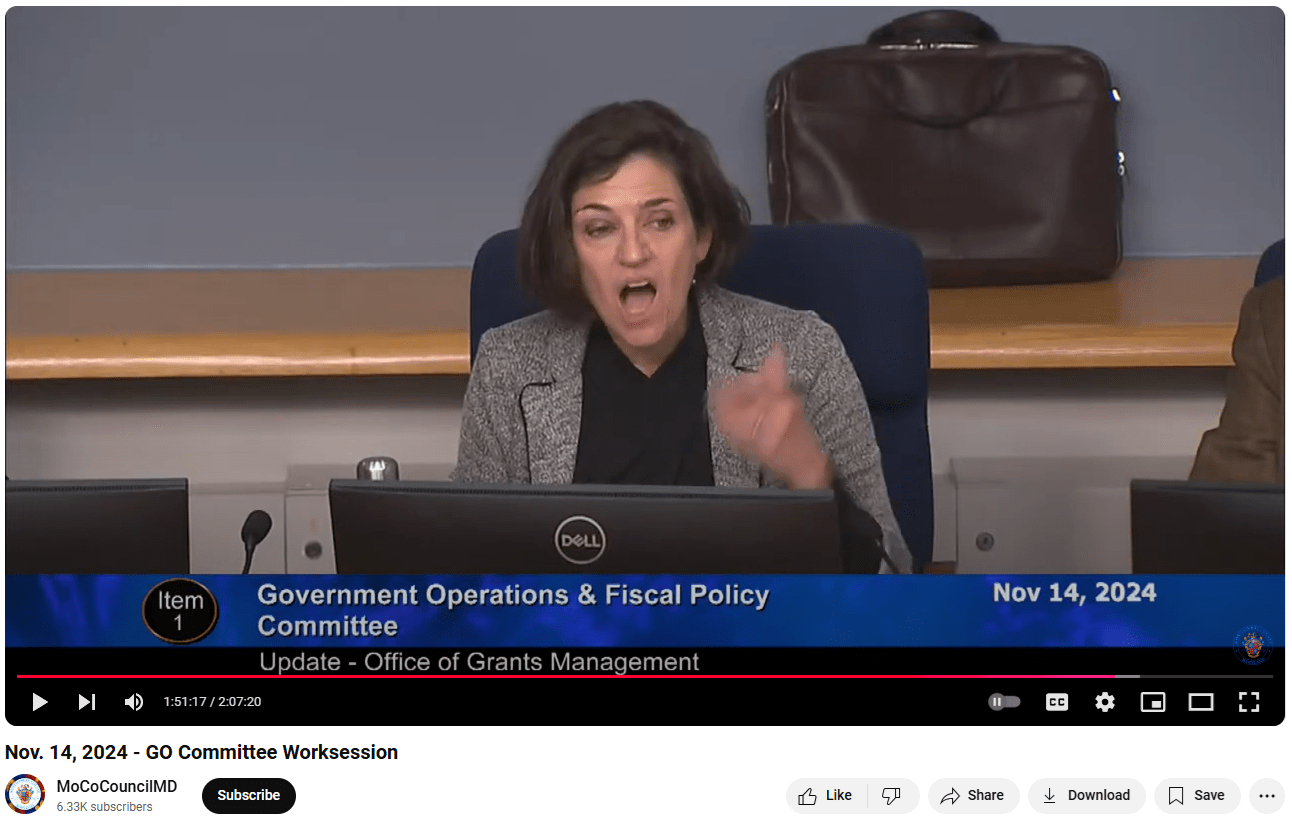By Adam Pagnucco.
Last Thursday, the county council’s Government Operations and Fiscal Policy Committee took up the county’s beleaguered grants program, a subject of mounting unhappiness among the local nonprofit community. Normally a sleepy subject, the slumber was sharply cut short by complaints from exasperated council members. How long will this go on?
For many years, the county government has relied on a network of nonprofits to provide services to county governments. In the past, the executive branch and the county council maintained separate processes on how nonprofits could apply for community grants. The executive branch’s process had little if any transparency and its grants were simply announced in the executive’s recommended budget. The council’s process drew on a grants advisory group convened by council staff to review applications. The council’s grants were added to the executive’s and both were listed in approved operating budgets.
The dueling processes confused and frustrated nonprofits, ultimately resulting in a 2018 Office of Legislative Oversight report examining options for improvement. In FY23, the county established the Office of Grants Management (OGM) to consolidate and standardize the grants processes formerly used by both branches. Its mission was to “develop and support best practices for grants management throughout Montgomery County Government that are consistent with racial equity and social justice goals.” Going forward, all grants would be processed through this office.
However, OGM soon ran into problems reviewing grants. Some of these issues related to “staff on leave and existing vacancies.” OGM told council staff that 1.5 full-time equivalents (FTEs) were covering the work of 3.5 FTEs in FY25. There were also issues related to whether county employees or community members should be reviewing grants. The office has had just 3 to 6 FTEs throughout its three-year existence and has contended with more than 1,400 grant applications over that time period. These issues have occurred despite the council fully funding all of the executive’s recommended budgets for the office.

OGM’s workload since its establishment. It’s a ton of grants for a tiny office to process.
As OGM began falling behind and one fiscal year began bleeding into another, the county instituted three bridge extensions to nonprofits totaling 11 months in 2023 and 2024 to avoid service gaps. Finally, the executive branch reacted by unilaterally awarding “FY25 Legacy Community Grant Awards” without the participation of the county council. Council staff described these “legacy grants” this way:
After the FY25 operating budget was approved by the County Council, the County Executive approved an additional year of funding for FY23 Community Grants recipients who applied for FY24 community grant funding but did not receive an award. The FY25 legacy awards were provided to 102 organizations for a total of $4.7 million. Of these awards, 90 have been fully executed with extended funding lasting through the end of FY25 (June 30, 2025). 12 awards (totaling $477,527) remain outstanding in a various stage in the grant development or approval process…
As Council was not part of the decision FY25 Legacy award decision, the [Government Operations] Committee should discuss the ongoing programmatic and fiscal impact of legacy awards as part of the strategic plan for Community Grants.
So more than 100 nonprofits went through the county’s application process and did not win awards, and then County Executive Marc Elrich gave them money anyway without the council’s input. Let’s remember that OGM’s mission stated above includes instituting “best practices” in grant management.
Surveying the wreckage, Council Member Sidney Katz told OGM Director Rafael Murphy, “We have made a process where we are trying to keep, maybe our best partners – we have a lot of good partners in Montgomery County – but maybe our best partners in Montgomery County whole and we have made it as confusing as it possibly can be… We are treating our nonprofit partners horribly.”
The consequence of the executive branch’s failure to keep up with grant applications and standardize the grants process is that the old system of black boxes effectively continues – except now it has backlogs. Government Operations Chair Kate Stewart, who is normally cooler than a winter lake, actually raised her voice when discussing this. Following is an exchange she had with Murphy, the grants office director.
*****

A sight seldom seen in Rockville: an angry Council Member Kate Stewart.
Council Member Kate Stewart: So let’s talk about the legacy grants and moving forward because as was noted that these were for a year for these legacy organizations and that the funding is supposed to end in June, June 30th, what is the communications that is going out to them and plans as we’ve, I think my colleagues have talked about in terms of these organizations that the work they’re doing and what is the county exec office seeing in terms of where we’re going with these legacy grants?
OGM Director Rafael Murphy: In terms of communication, we have consistently told them from the initial notification emails and notification letters and follow-ups, the information sessions that we had for them in their awards and technical aspects of doing that, that the continuation of funding would be dependent on the FY26 budget process. And so we’re in the midst of that process and so I don’t have a decision yet on how that is going to be approached.
Stewart: So I think we’re – I appreciate, Mr. Murphy, the position you’re in on this… That approach is not really sufficient for our organizations and we’re going to end up the same place we were last year. Because what’s going to happen is the budget gets finalized, you know, in May and if these organizations have to wait for the whole budget process until June, and then it ends on June 30th, we have the same issue that we had last year where we needed to continue the bridge funding.
In addition to that, the whole reason we’ve all talked about going through this process over many years was to take politics out of this. And in my mind, having these legacy organizations which, I’m trying to find the actual number, but it’s a significant number of organizations who perform these services, now going to be dependent on what is in the budget – so that’s what the county exec then sends up to us, and then what we look at – how are we not going back to where we were before your office was ever created?
And again, I understand your position. But this really feels like we’re, with these legacy organizations and the amount of money, the number of organizations we’re talking about, is that we’re taking a huge step backwards now and just repeating and putting back into place the process that we tried to undo. Again, I understand your position as the director of the Office of Grants Management and where you are. And so if you have no response, I understand that. But I think this is something that we need to strongly communicate to the county exec’s office.
Because I’m going to speak as the chair of government operations and fiscal policy, as the vice-president, as hopefully the incoming president. I will be beyond furious if actually we get a budget and that each of us on the dais are going to be faced with talking to our nonprofit organizations and making decisions on whether or not they get funding again. Because that is a position that none of us want to be in and that in fact a lot of people in the community have worked really hard to make sure that we’re not in that position, and to make sure our nonprofit partners aren’t.
*****
Council Member Andrew Friedson underlined Stewart’s point. “I will note the dynamic as was noted by Chair Stewart. If part of the goal was to get the politics out of these decisions and create an objective process and to have a mechanism for accountability and for communication, this would reflect the exact opposite of that. All of it.”
To his credit, Murphy did not run and hide. He told the council point blank: “No one wants to do this differently more than me.” But one gets the impression that it’s not all on him. What of his superiors on the second floor, who did not attend the council meeting? Stewart and Friedson often seemed to be addressing them, not Murphy, despite their absence.
One source told me, “It’s a mess. The plan was to create an Office of Grants Management to handle ALL grants – incoming and outgoing – including the community grants that historically were determined by the council. But OGM was not in any way prepared to take over. It was a debacle. The director is trying his best and I think he is qualified, but the rollout continues to be a disaster.”
How much longer will the disaster go on?
